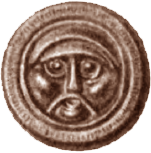The Varangian Guard were Vikings that had eventually found their way to the capital of the Byzantine Empire. As was the case with most things, the Vikings’ first interactions were raids as a result of Viking exploration.

The city of Byzantium provided a unique challenge to Viking warlords, not because of its formidable defenses, but for the better life it was able to offer to the Norsemen. After the earliest contact with the Empire, many Vikings saw the city as a more stable route of pay than the princes they served, and the Empire’s history of using barbarian mercenaries gave the Vikings an easy path to a more secure career. The Norsemen that chose to serve the empire would eventually become known as the Varangian Guard. From the beginning of their inception the Varangians served with distinction in the existing regiments of the Emperor’s elite guard, until 988, when a separate branch was formed entirely of Norsemen in response the baptism of a prominent Viking leader. At that time the Varangians can be seen as becoming symbolic of the rest of the Vikings that eventually converted out of their old ways into Christianity, even if the Varangians were motivated only by wealth and glory.

While the motivation for achieving the easy Christian life offered at Byzantium was initially to reap the easy rewards of a relaxed lifestyle, the Varangian Guard eventually became known as one of the most loyal divisions at the Emperor’s command. The Varangians’ extreme loyalty to their new emperor may stem from their pagan roots as many of them saw it as an ancestral profession passed down from generations despite the Vikings only fighting for the Emperor for a few centuries. Much like the elite Roman Praetorians, the Varangians were involved in the politics of their empire, but unlike the Praetorians they never interfered for personal gain. There were numerous attempts to overthrow Emperors, but the Varangians reliably defended the Emperors from any attempted traitors. However, the Varangians not only served as the staunch bodyguards of the Emperor but were also able to act as Byzantine special forces when the conventional soldiers were unable to finish the job.

During the reign of Emperor John II, the Byzantines attacked a caravan of hostile Pechenegs that had so entrenched themselves as to be impervious to attack. The Emperor’s generals begged him to send in his elite Guardsmen, but he was too afraid to lose them. Upon hearing of the Emperor’s fear, the Varangian leader decreed that he and his men would run into a fire if the Emperor decreed it (Davidson, 191). It only took the Varangian Guard a single mounted charge to break the enemy’s formation and put them to rout. The Varangian Guard combined the fabled ferocity of the Vikings with the regulated society of the Eastern Roman Empire creating one of the most effective fighting forces the Empire had ever seen.

[S. G.]